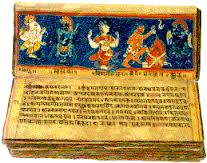
The wisdom behind the creation of Jinn and human beings is that they recognize their Lord and worship Him Alone, though Allah is in no need of worship by anyone.
In Islam, the term ‘worship’ refers to any deed that one does within the teachings of Islam seeking the Pleasure of Allah. It can be mental, physical, spoken or otherwise. All such actions will be rewarded. There are five acts of worship that are so fundamental that the Prophet Muhammad (peace be upon him) grouped them together as the Five Pillars of Islam. Every Muslim is expected to fulfill these obligations. They are:
Shahadah (The Declaration of Faith)
Recognizing and acknowledging the monotheistic nature of Allah stands at the core of Islam. This is to firmly believe in the heart and declare: “I bear witness that there is no one worthy of worship except Allah, and I bear witness that Muhammad is Allah’s Messenger.” This is known as the Shahadah. Once a person declares it, he or she becomes a Muslim.
The Shahadah has two parts. Firstly, it is a declaration that Allah is the only Lord and Ruler, and He Alone is worthy of worship. He has no partner, and He cannot be compared with any other thing. Everything is under His Control and His Command. Mankind is also required to live according to the Commands of Allah. Allah loves those who follow His command and He dislikes those who disobey Him.
The second part of the Shahadah is the declaration that Muhammad (peace be upon him) is the Messenger of Allah. He was selected by Almighty Allah as the last Messenger and was given the Glorious Qur’an. Muslims are required to obey the Prophet (peace be upon him) and follow his example without hesitation. Muslims are also required to honor and respect him offering blessings and salutations. Whenever his name is mentioned we must say: Sallallaahu alayhi wa sallam meaning “Allah’s peace and blessings upon him.”
Salah – Prayer
Prayer or Salah is obligatory on every Muslim five times a day.
Almighty Allah says:
Verily, the prayer is enjoined on the believers at fixed hours. (An-Nisa’4:103)
It is the distinguishing feature of Islam and the most obvious act by which a Muslim shows his obedience to Allah. A person who abandons prayer is at utmost risk.
Allah created us for wisdom; it is to Worship Him Alone. Almighty Allah says:
I have only created jinn and men, that they may worship Me. (Az-Zariyat 51:56)
Praying regularly reminds us of this purpose and brings us closer to Allah thereby preventing us from straying off the right path. Almighty Allah says:
O all you who believe, bow down and prostrate yourselves and worship your Lord, and do good deeds, so that you may be successful. (Al-Hajj 22:77)
Theoretical recognition of Allah and saying you believe in your heart is not sufficient. Many people say that they worship Allah in their own way, but by taking this view we make ourselves gods and decide how Allah should be worshipped, rather than following His Command.
The five daily prayers have a physical and spiritual nature. They consist of a series of bowings and prostrations together with recitations of the Glorious Qur’an and praises of Allah, complemented by supplication and prayer. They are a fusion of body, soul and mind. We start the day with Fajr (Dawn) Prayer which is performed at the morning twilight before sunrise; the second prayer is Zuhr (Noon) Prayer, performed after the sun has passed its zenith or highest point at noon; then at mid-afternoon `Asr (Afternoon) Prayer is performed; Maghrib (Sunset) Prayer is performed after sunset, and the final prayer of the day is `Isha’ (Night) Prayer, which is performed after the onset of night. The five daily prayers reaffirm again and again that we are in the service of Allah. Almighty Allah says:
Verily, in the remembrance of Allah do hearts find rest. (Ar-R`ad 13:28)
Zakat – Alms giving
Zakat means purification and growth. Once a year every Muslim who has properties that reach the Nisab (minimum Zakah amount) must give 2.5 % of them. It is way of doing our duty to other Muslims less fortunate to us. Giving Zakat reminds a person that his wealth is not his own, but its real owner is Allah. This should make a person ready to spend in accordance with Allah’s Command. Almighty Allah says:
Truly, those who believe and do deeds of righteousness, and perform Salat, and give Zakat, they will have their reward with their Lord, on them shall be no fear, nor shall they grieve. (Al-Baqarah 2:277)
Zakat is not tax imposed by Islam, but a due fixed by Allah so that the wealth of a person may be purified. It is an act of worship that purifies the heart from selfishness and greed for wealth. In return, it purifies the heart of the recipient from envy and jealousy, from hatred and uneasiness; and fosters in his heart, instead, good will and warm wishes for the contributor. It is a way of showing sympathy to those who are less fortunate. It is also to bridge the gap between the rich and the poor. As a result, the society at large; will purify and free itself from class warfare and suspicion, from ill feelings and distrust, from corruption and disintegration, and from all such evils.
_________________
Source: Taken from www.islamislife.org with modifications.
[opic_orginalurl]


